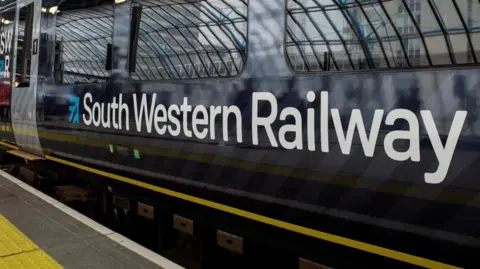On May 25, 2025, an important shift in the rail transport industry in the United Kingdom occurs as South Western Railway (SWR) transitions from private management back to public ownership. This moment is eagerly anticipated by many, particularly train enthusiasts and collectors of railway memorabilia who are seeking the inaugural ticket of what would be the first train service post-renationalisation. However, this moment carries its own complications, as the first scheduled train service, which would typically run at 02:27 from Guildford to Waterloo, has been cancelled due to necessary engineering works.
Instead of a train, passengers will find themselves reliant on a bus replacement service—an unexpectedly underwhelming beginning for the newly nationalised service. The next scheduled offering, a train out of Woking at 05:36, is likewise impacted, with tickets priced at £15.20. This situation is not ideal, as the first experience of passengers under the newly integrated system could lead to disappointment and frustration.
Despite these early hurdles, public figures like Labour MPs express optimism regarding the benefits of SWR’s transition to public ownership. Transport Secretary Heidi Alexander’s unveiling of the new Great British Railways logo in Bournemouth showcased the government’s commitment to improving the rail system within the country. Supporters like Amanda Martin, MP for Portsmouth, reflect on the personal significance and pride involved in this transition, sharing a poignant connection through her grandfather’s previous role as a train driver. Martin anticipates that while fares may not drop immediately, the improvements in service delivery and passenger experience will materialize over time.
However, many industry experts are cautious about potential outcomes. Olly Glover, a Liberal Democrat MP and member of the transport committee, emphasizes that nationalisation could present significant opportunities, but achieving true progress will necessitate clear directives from the government. He insists that the government must clarify its expectations in terms of economic, social, and environmental outcomes if the initiative is to yield positive results. A recurring concern is the possibility that too much governmental involvement could stifle innovation and responsiveness within the transportation sector.
As discussions unfold, there are also voices advocating for heightened competition within the newly public framework. Former Conservative MP Chris Loder, who previously worked for South West Trains, contextualizes the growth seen during privatization. While he acknowledges notable passenger increases and significant investments made during that era, he advocates for the inclusion of open-access operators on the network, which could present fresh competition and encourage enhanced services benefiting those who travel.
There is a shared understanding among supporters of the nationalisation that notable improvements will not materialize overnight. Structural and systemic challenges lie ahead, as operational adjustments become imperative to adapt to transforming passenger behaviors and expectations in the modern era.
Amid these intricate discussions and anticipated changes, it remains to be seen how the re-nationalisation of South Western Railway will ultimately affect everyday passengers. The journey toward enhanced rail service delivery and experience is ongoing, with uncertainties weighing on the immediate effects of this pivotal transition.
As passengers start their journeys under the new system, the hope is to move beyond replacement buses and towards a railway experience characterized by reliability and affordability. It symbolizes not just a change in ownership but a potential renaissance for Britain’s rail future, one that stakeholders, passengers, and policymakers are watching keenly.



